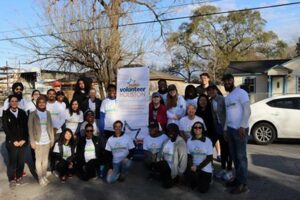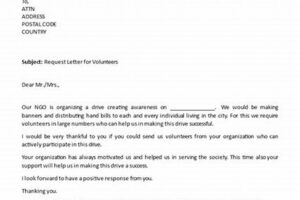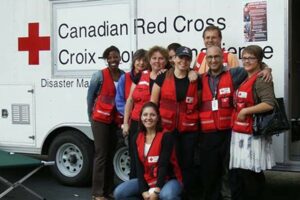Table of Contents
In a world where LGBTQ youth often face stigma, discrimination, and rejection, the Trevor Project stands as a beacon of hope. This organization provides life-saving crisis intervention and suicide prevention services to lesbian, gay, bisexual, transgender, queer, and questioning (LGBTQ) young people through a variety of platforms, including phone, text, and chat.
At the heart of the Trevor Project’s success are its dedicated volunteers. These compassionate individuals provide confidential support, resources, and information to LGBTQ youth in need. They are trained to listen actively, empathize with the caller’s experiences, and provide support and guidance.
Becoming a Trevor Project volunteer is a rewarding and impactful experience. Volunteers have the opportunity to make a real difference in the lives of LGBTQ youth, helping them feel seen, heard, and supported. They also gain valuable skills in crisis intervention, suicide prevention, and LGBTQ cultural competency.
Trevor Project Volunteer
Make a difference, save lives.
- Provide confidential support
- Active listening and empathy
- LGBTQ cultural competency
- Crisis intervention skills
- Suicide prevention knowledge
- Rewarding and impactful experience
- Help LGBTQ youth feel seen
- Be a beacon of hope
- Join a caring community
Trevor Project volunteers are the heart of our organization. Their compassionate support and guidance help LGBTQ youth feel safe, supported, and loved.
Provide Confidential Support
Confidentiality is a cornerstone of the Trevor Project’s services. LGBTQ youth who reach out for help need to know that their conversations will be kept private and secure.
- Respect for Privacy: Trevor Project volunteers treat all conversations with the utmost respect for privacy. They do not share personal information with anyone outside the organization without the caller’s consent.
- Safe Space: Volunteers create a safe and supportive space for LGBTQ youth to talk about their experiences and feelings without fear of judgment or discrimination.
- Anonymous Communication: Callers can choose to remain anonymous if they wish. They do not have to provide their name, address, or any other identifying information.
- Secure Platform: The Trevor Project uses a secure online platform to protect caller information. All conversations are encrypted and stored securely.
By providing confidential support, Trevor Project volunteers help LGBTQ youth feel safe and comfortable reaching out for help. This can be a life-saving step for young people who are struggling with suicidal thoughts or other mental health challenges.
Active Listening and Empathy
Active listening and empathy are essential skills for Trevor Project volunteers. When a LGBTQ youth reaches out for help, they need to feel heard and understood. Volunteers demonstrate active listening and empathy by:
1. Paying Full Attention: Volunteers give the caller their full attention, making eye contact (if speaking in person) and avoiding distractions. They focus on what the caller is saying, both verbally and nonverbally.
2. Reflecting and Paraphrasing: Volunteers reflect and paraphrase the caller’s words to show that they are listening and understanding. This helps the caller feel heard and validated.
3. Asking Open-Ended Questions: Volunteers ask open-ended questions to encourage the caller to share more about their experiences and feelings. This can help the caller gain insight into their situation and identify potential solutions.
4. Showing Empathy: Volunteers show empathy by trying to understand the caller’s perspective and feelings. They avoid making judgments or giving advice unless asked.
By demonstrating active listening and empathy, Trevor Project volunteers create a safe and supportive space for LGBTQ youth to talk about their experiences and feelings. This can be a life-saving step for young people who are struggling with suicidal thoughts or other mental health challenges.
LGBTQ Cultural Competency
LGBTQ cultural competency is essential for Trevor Project volunteers to provide effective support to LGBTQ youth. Cultural competency means having the knowledge, skills, and attitudes necessary to understand and interact effectively with people from diverse LGBTQ cultures. Trevor Project volunteers demonstrate LGBTQ cultural competency by:
1. Understanding LGBTQ Terminology and Identities: Volunteers are familiar with the diverse range of LGBTQ identities and the language used to describe them. They use inclusive and affirming language when speaking with callers.
2. Recognizing LGBTQ-Specific Issues: Volunteers are aware of the unique challenges and experiences faced by LGBTQ youth, such as discrimination, bullying, and family rejection. They are also familiar with the resources and support services available to LGBTQ youth.
3. Being Sensitive to Intersectionality: Volunteers understand that LGBTQ youth may also experience discrimination and marginalization based on other aspects of their identity, such as race, ethnicity, religion, or disability. They are sensitive to these intersections and provide support accordingly.
4. Creating an Inclusive and Affirming Environment: Volunteers create an inclusive and affirming environment where LGBTQ youth feel safe and respected. They use inclusive language, display LGBTQ-affirming symbols, and challenge any homophobic or transphobic attitudes or behaviors.
By demonstrating LGBTQ cultural competency, Trevor Project volunteers help LGBTQ youth feel seen, heard, and supported. This can be a life-saving step for young people who are struggling with suicidal thoughts or other mental health challenges.
Crisis Intervention Skills
Crisis intervention skills are essential for Trevor Project volunteers to help LGBTQ youth who are in immediate danger. These skills enable volunteers to assess the caller’s risk of suicide or self-harm, provide immediate support, and connect the caller to appropriate resources.
- Assessing Risk: Volunteers are trained to assess the caller’s risk of suicide or self-harm. They ask specific questions to gather information about the caller’s thoughts, feelings, and behaviors.
- Providing Immediate Support: Volunteers provide immediate support to the caller by listening actively, showing empathy, and validating the caller’s feelings. They also help the caller to develop coping mechanisms and safety plans.
- Connecting to Resources: Volunteers connect the caller to appropriate resources, such as crisis hotlines, mental health services, and LGBTQ-affirming support groups. They also provide information about local LGBTQ-friendly shelters and safe spaces.
- Following Up: Volunteers follow up with the caller to check on their well-being and ensure that they are connected to the resources they need. They may also provide additional support and guidance as needed.
By demonstrating crisis intervention skills, Trevor Project volunteers help LGBTQ youth who are in immediate danger. These skills can be life-saving for young people who are contemplating suicide or self-harm.
Suicide Prevention Knowledge
Suicide prevention knowledge is essential for Trevor Project volunteers to effectively support LGBTQ youth who are struggling with suicidal thoughts or behaviors. Volunteers are trained in suicide prevention best practices, including:
1. Recognizing Suicide Warning Signs: Volunteers are familiar with the warning signs of suicide, such as talking about death or suicide, feeling hopeless or worthless, withdrawing from social activities, and engaging in risky or self-destructive behaviors. They are also trained to recognize the unique risk factors for suicide among LGBTQ youth.
2. Assessing Suicide Risk: Volunteers are trained to assess the caller’s risk of suicide. They ask specific questions to gather information about the caller’s thoughts, feelings, and behaviors. This information is used to develop a safety plan and connect the caller to appropriate resources.
3. Providing Immediate Support: Volunteers provide immediate support to the caller by listening actively, showing empathy, and validating the caller’s feelings. They also help the caller to develop coping mechanisms and safety plans.
4. Connecting to Resources: Volunteers connect the caller to appropriate resources, such as crisis hotlines, mental health services, and LGBTQ-affirming support groups. They also provide information about local LGBTQ-friendly shelters and safe spaces.
By demonstrating suicide prevention knowledge, Trevor Project volunteers help LGBTQ youth who are struggling with suicidal thoughts or behaviors. These skills can be life-saving for young people who are contemplating suicide or self-harm.
Rewarding and Impactful Experience
Volunteering with the Trevor Project is a rewarding and impactful experience. Volunteers have the opportunity to make a real difference in the lives of LGBTQ youth, helping them feel seen, heard, and supported. They also gain valuable skills in crisis intervention, suicide prevention, and LGBTQ cultural competency.
- Making a Difference: Trevor Project volunteers know that they are making a real difference in the lives of LGBTQ youth. They receive regular feedback from the organization about the impact of their work, and they often hear directly from callers who express their gratitude and appreciation.
- Gaining Valuable Skills: Volunteers gain valuable skills in crisis intervention, suicide prevention, and LGBTQ cultural competency. These skills are not only helpful in their volunteer work, but they are also transferable to other areas of their lives, such as their careers and personal relationships.
- Being Part of a Supportive Community: Trevor Project volunteers are part of a supportive community of like-minded individuals who are passionate about helping LGBTQ youth. Volunteers have the opportunity to connect with other volunteers, share their experiences, and learn from each other.
- Personal Growth and Development: Volunteering with the Trevor Project can be a transformative experience that leads to personal growth and development. Volunteers often report feeling more confident, compassionate, and resilient as a result of their work.
If you are interested in making a difference in the lives of LGBTQ youth, volunteering with the Trevor Project is a rewarding and impactful opportunity. You will gain valuable skills, be part of a supportive community, and experience personal growth and development.
Help LGBTQ Youth Feel Seen
LGBTQ youth often feel isolated and alone, especially if they do not have supportive family and friends. Trevor Project volunteers help LGBTQ youth feel seen and heard by:
- Listening Actively: Volunteers listen actively to callers, giving them their full attention and showing that they care about what they have to say.
- Showing Empathy: Volunteers show empathy by trying to understand the caller’s perspective and feelings. They avoid making judgments or giving advice unless asked.
- Validating Their Feelings: Volunteers validate the caller’s feelings, letting them know that their feelings are real and important.
- Providing Support and Resources: Volunteers provide support and resources to callers, such as information about LGBTQ-affirming mental health services, support groups, and shelters.
By helping LGBTQ youth feel seen and heard, Trevor Project volunteers can help them feel less alone and more connected to the world around them. This can be a life-saving step for young people who are struggling with suicidal thoughts or other mental health challenges.
Be a Beacon of Hope
Trevor Project volunteers are beacons of hope for LGBTQ youth who are struggling with suicidal thoughts or other mental health challenges. They provide a lifeline for young people who feel alone and绝望.
- Offering Support and Guidance: Volunteers offer support and guidance to callers, helping them to cope with their challenges and develop healthy coping mechanisms.
- Empowering Youth: Volunteers empower LGBTQ youth by helping them to recognize their own strength and resilience. They help callers to develop self-esteem and self-acceptance.
- Providing a Safe Space: Volunteers create a safe space for LGBTQ youth to talk about their experiences and feelings without fear of judgment or discrimination.
- Showing that They Care: Volunteers show LGBTQ youth that they care about them and that they are not alone. They let callers know that there are people who are there to support them and help them through their challenges.
By being beacons of hope for LGBTQ youth, Trevor Project volunteers can help these young people to feel more connected to the world around them and to see a future for themselves. This can be a life-saving step for young people who are struggling with suicidal thoughts or other mental health challenges.
Join a Caring Community
Trevor Project volunteers are part of a caring community of like-minded individuals who are passionate about helping LGBTQ youth. Volunteers have the opportunity to connect with other volunteers, share their experiences, and learn from each other.
Benefits of Joining the Trevor Project Community:
- Support and Encouragement: Volunteers can connect with other volunteers who understand the challenges and rewards of volunteering with the Trevor Project. They can provide support and encouragement to each other, and they can share ideas and best practices.
- Networking and Learning: Volunteers have the opportunity to network with other volunteers and staff members from the Trevor Project. This can be a great way to learn more about LGBTQ youth issues and to develop new skills.
- Personal Growth and Development: Volunteering with the Trevor Project can be a transformative experience that leads to personal growth and development. Volunteers often report feeling more confident, compassionate, and resilient as a result of their work.
- Making a Difference: Volunteers know that they are making a real difference in the lives of LGBTQ youth. They receive regular feedback from the organization about the impact of their work, and they often hear directly from callers who express their gratitude and appreciation.
If you are interested in making a difference in the lives of LGBTQ youth, joining the Trevor Project community is a rewarding and impactful opportunity. You will gain valuable skills, be part of a supportive community, and experience personal growth and development.
FAQ
Have questions about volunteering with the Trevor Project? Here are some frequently asked questions and answers:
Question 1: What are the requirements to become a Trevor Project volunteer?
Answer 1: To become a Trevor Project volunteer, you must be at least 18 years old, have a strong internet connection, and be able to commit to a minimum of one shift per week.
Question 2: What kind of training do volunteers receive?
Answer 2: Volunteers receive comprehensive training on a variety of topics, including LGBTQ cultural competency, crisis intervention, and suicide prevention. Training is conducted online and takes approximately 20 hours to complete.
Question 3: What are the different volunteer roles available?
Answer 3: There are two main volunteer roles at the Trevor Project: crisis counselors and text message responders. Crisis counselors provide support to LGBTQ youth via phone or chat, while text message responders provide support via text message.
Question 4: How much time do volunteers need to commit?
Answer 4: Volunteers are expected to commit to a minimum of one shift per week, which is typically 3-4 hours long. Volunteers can choose their own shifts and work from the comfort of their own home.
Question 5: What kind of support do volunteers receive?
Answer 5: Volunteers receive ongoing support from the Trevor Project staff. This includes regular supervision, access to a support network of other volunteers, and opportunities for professional development.
Question 6: How can I apply to become a Trevor Project volunteer?
Answer 6: To apply to become a Trevor Project volunteer, visit our website and fill out an application form. You will be contacted by a member of our recruitment team if you are selected for an interview.
Question 7: What is the impact of volunteering with the Trevor Project?
Answer 7: Volunteering with the Trevor Project can be a life-saving experience for LGBTQ youth. Volunteers provide vital support to young people who are struggling with suicidal thoughts or other mental health challenges. Volunteers also help to raise awareness about LGBTQ youth suicide prevention and to create a more supportive and inclusive world for LGBTQ youth.
Closing Paragraph:
If you are passionate about helping LGBTQ youth and want to make a difference in their lives, volunteering with the Trevor Project is a rewarding and impactful opportunity. We encourage you to apply today and join our team of dedicated volunteers who are making a difference in the lives of LGBTQ youth every day.
Once you have become a Trevor Project volunteer, here are some tips to help you make the most of your experience:
Tips
Here are some practical tips to help you make the most of your experience as a Trevor Project volunteer:
Tip 1: Be patient and compassionate.
Remember that the LGBTQ youth you are supporting are going through a tough time. Be patient and compassionate, and try to understand their perspective. Avoid making judgments or giving advice unless asked.
Tip 2: Be a good listener.
One of the most important things you can do as a volunteer is to be a good listener. Give the caller your full attention and let them know that you are there to support them. Active listening can help the caller to feel heard and understood.
Tip 3: Be knowledgeable about LGBTQ issues.
Make sure you are up-to-date on the latest news and information about LGBTQ issues. This will help you to better understand the challenges and experiences of the LGBTQ youth you are supporting.
Tip 4: Take care of yourself.
Volunteering can be emotionally challenging, so it is important to take care of yourself. Make sure you are getting enough sleep, eating healthy foods, and exercising regularly. It is also important to talk to someone if you are feeling overwhelmed or stressed.
Closing Paragraph:
By following these tips, you can make a real difference in the lives of LGBTQ youth. You can help them to feel seen, heard, and supported. You can also help them to find the resources they need to get the help they deserve.
Volunteering with the Trevor Project is a rewarding and impactful experience. You will gain valuable skills, be part of a supportive community, and make a real difference in the lives of LGBTQ youth.
Conclusion
Trevor Project volunteers are the heart of our organization. They provide confidential support, active listening, and empathy to LGBTQ youth in need. They are trained in LGBTQ cultural competency, crisis intervention, and suicide prevention. Volunteering with the Trevor Project is a rewarding and impactful experience. Volunteers gain valuable skills, be part of a supportive community, and make a real difference in the lives of LGBTQ youth.
Closing Message:
If you are passionate about helping LGBTQ youth and want to make a difference in their lives, we encourage you to apply to become a Trevor Project volunteer. You will be joining a team of dedicated individuals who are committed to providing life-saving support to LGBTQ youth. Together, we can create a more hopeful and inclusive world for LGBTQ youth.






